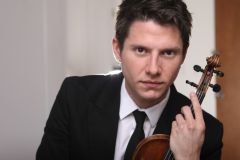OPUS Scholars
Master of Arts, Music
Most programs in the UCF School of Performing Arts require an audition or interview.
UCF is internationally recognized as an institution genuinely committed to inclusive excellence by offering the highest quality educational opportunities and experiences for students from historically underrepresented backgrounds.
In partnership with the UCF School of Performing Arts and the Orlando Philharmonic Orchestra, the OPUS Scholars program is a first-of-its-kind educational curriculum which offers professional resume-building orchestral experience, formal study in all facets of performing arts administration with leaders in the field, and institution-backed support for a 21st century career.
Students accepted into the program will earn a Master of Arts degree in Music Studies and receive a graduate student assistantship.
At this time, the OPUS Scholars program is open only to violinists, cellists and double bassists. This program is an effort to expand access in the field of classical music to students from underrepresented communities.
OPUS Scholars is accepting applications and auditions for the third cohort of students to begin in Fall 2026.
Assistantships and Stipends
Students awarded the assistantships will receive a stipend of $10,000 for a nine-month period in addition to a tuition waiver during each of their two years of study. Duties for the assistantship include 2-3 rehearsal-performance series per semester as an OPUS Scholar-member of the Orlando Philharmonic.
Applications will not be considered unless the student has applied for admission to the MA in Music.
Assistantship ApplicationImmersive Experience
As a unique opportunity and not similar to a typical internship, coursework for the program includes four semesters (for credit) of immersive experience through the UCF/OPO Arts Administration Sequence in which students are individually mentored in executive and artistic management, marketing and sales, education and community outreach, and philanthropy and finance. The curriculum also provides intensive study with UCF’s world-class faculty and guest artists in lessons, masterclasses, orchestral repertoire coaching, and other additional master’s level courses.
For additional details and program of study or with questions, contact UCF program director and violin professor Dr. Ross Monroe Winter.
Audition Details
Applicants are encouraged to schedule and attend a live audition in Orlando, but for those living at a significant distance where travel may not be feasible, a pre-recorded video audition may be submitted through Acceptd.com. As part of the audition, applicants will also participate in an interview with UCF faculty and OPO representatives either in person or via Zoom.
All applicants will need to submit separate applications though UCF admissions for the College of Graduate Studies and for the graduate assistantship by January 15.
Early submission of application materials is strongly encouraged.
Audition Dates
February 7, 14, and 28, 2026
Alternate in-person dates may be requested on an individual basis but cannot be guaranteed. In-person auditions are strongly recommended, but video auditions are also permitted through Acceptd.com for students coming from a significant distance.
OPUS Scholars Audition Repertoire
Violin
- A fast and slow movement of a standard Romantic or 20th century concerto such as Mendelssohn, Dvorak, Tchaikovsky, Wieniawski, Prokofiev, Glazunov, Bruch, Shostakovich, Khachaturian OR a complete classical concerto such as Mozart, Saint-Georges, or José White
- One (preferably two) movements of an unaccompanied Sonata or Partita by J.S. Bach
- A virtuosic showpiece such as Wieniawski, Sarasate, Ravel or a virtuosic etude/caprice such as Paganini, Rode, Dont, or Gavines (20th/21st century compositions demonstrating virtuosity are encouraged although not required, e.g. Jessie Montgomery’s Rhapsody No. 1 or Lera Auerbach’s Lonely Suiteif including the 3rd movement)
- At least one selection above should be performed from memory
- Orchestral excerpts:
- Mozart Symphony No. 39, Mvmt. II mm1-27
- Brahms Symphony No. 4, Mvmt IV mm33-80
- Optional: Strauss Don Juan, first page
Cello
- First movement of a major concerto including cadenzas where appropriate
- Two movements from any of the Six Cello Suites by J.S. Bach (performed by memory)
- A work of choice that best represents the applicant’s self-expression
- Orchestral excerpts:
- Beethoven Symphony No. 5, Mvmt III Trio (no repeat)
- Brahms Symphony No. 2, Mvmt II mm1-15
- Optional: Strauss Don Juan, mm1-49
Double Bass
- First movement of a major concerto (Dittersdorf, VanHal, Koussevitsky), no cadenza required.
- Two movements from any of the Six Cello Suites by J.S. Bach (Minuets and Bourees I and II equal one movement)
- Orchestral excerpts:
- Mozart Symphony 39, movement 1: measures 40-93
- Brahms Symphony No. 2, movement 1: Letters E to F
- Optional: Strauss Don Juan, Letter A to 4 after Letter C

